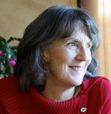Arleen Williams's Blog, page 21
June 4, 2015
Finding Home: Other Voices
Today Bonnie Dodge shares her childhood memories of a North Dakota rural home.

Avenues, homesteads, and college dorms. Each of these represents a place someone once called home. Not me, I’ve never lived on an avenue, and I only spent a brief time in a college dorm. I never homesteaded land, but my father did. Sort of.
I was born in North Dakota, and anyone passing through that state, or from that state, knows there is nothing in North Dakota to stay your feet but the land. And there is plenty of land. It stretches flat around you in every direction, most of it looking all the same. Acres of grasslands. Miles and miles of farmland someone might want to call home.
When I was six, my father bought an acreage outside Bismarck. One of thirteen children raised on a farm near Kulm, North Dakota, his heart always belonged to the land even though he worked as a small appliance repairman. Somehow he scraped up enough money to by land seven miles from town onto which he moved two old barracks. He knitted them together the best he could and for a while that is where we called home.
There were no paved roads or streetlights to shine in the windows at night and keep me awake. On one side of our gravel road sunflowers grew so tall we kids could get lost in there. On the other side of the road corn tasseled in the summer sun. If we stood still long enough, we could actually hear it grow. Our father planted trees and it was our job to soak them once a week from the water left over from washing clothes. Sloshing our half-full pails, we coaxed those trees to live. It gave us something else to do besides ride our bikes up and down the dusty roads or pull the legs off of the grasshoppers that stained our hands dark brown. I loved living in the country: dirt roads, acres of sunflowers, prairie dogs, meadowlarks, blue skies that could suddenly turn dark and spit thunder.
When I was nine, my father moved us to Idaho, where I have lived ever since. Even so, in my heart North Dakota remains my home. When you live that close to the land it becomes part of you, a part of what you want, smell, and see.
Even today sitting at my desk and staring out across the cornfields that border my Idaho home, I see acres of sunflowers and prairie dogs. I hear the meadowlark, smell the sweet fragrance of the oncoming rain, and am reminded of home. Bonnie Dodge lives and writes from her home in southern Idaho. Her award-winning fiction, poetry, and non-fiction have appeared in several newspapers, magazines, and anthologies in the Pacific Northwest, including Idaho Magazine and Sun Valley Magazine. For more information visit her web page at http://bonniedodge.comand follow her on Twitter @BJDodge. Her novel Goldie's Daughter will be published this fall by Booktrope.
Bonnie Dodge lives and writes from her home in southern Idaho. Her award-winning fiction, poetry, and non-fiction have appeared in several newspapers, magazines, and anthologies in the Pacific Northwest, including Idaho Magazine and Sun Valley Magazine. For more information visit her web page at http://bonniedodge.comand follow her on Twitter @BJDodge. Her novel Goldie's Daughter will be published this fall by Booktrope.

Avenues, homesteads, and college dorms. Each of these represents a place someone once called home. Not me, I’ve never lived on an avenue, and I only spent a brief time in a college dorm. I never homesteaded land, but my father did. Sort of.
I was born in North Dakota, and anyone passing through that state, or from that state, knows there is nothing in North Dakota to stay your feet but the land. And there is plenty of land. It stretches flat around you in every direction, most of it looking all the same. Acres of grasslands. Miles and miles of farmland someone might want to call home.
When I was six, my father bought an acreage outside Bismarck. One of thirteen children raised on a farm near Kulm, North Dakota, his heart always belonged to the land even though he worked as a small appliance repairman. Somehow he scraped up enough money to by land seven miles from town onto which he moved two old barracks. He knitted them together the best he could and for a while that is where we called home.
There were no paved roads or streetlights to shine in the windows at night and keep me awake. On one side of our gravel road sunflowers grew so tall we kids could get lost in there. On the other side of the road corn tasseled in the summer sun. If we stood still long enough, we could actually hear it grow. Our father planted trees and it was our job to soak them once a week from the water left over from washing clothes. Sloshing our half-full pails, we coaxed those trees to live. It gave us something else to do besides ride our bikes up and down the dusty roads or pull the legs off of the grasshoppers that stained our hands dark brown. I loved living in the country: dirt roads, acres of sunflowers, prairie dogs, meadowlarks, blue skies that could suddenly turn dark and spit thunder.
When I was nine, my father moved us to Idaho, where I have lived ever since. Even so, in my heart North Dakota remains my home. When you live that close to the land it becomes part of you, a part of what you want, smell, and see.
Even today sitting at my desk and staring out across the cornfields that border my Idaho home, I see acres of sunflowers and prairie dogs. I hear the meadowlark, smell the sweet fragrance of the oncoming rain, and am reminded of home.
 Bonnie Dodge lives and writes from her home in southern Idaho. Her award-winning fiction, poetry, and non-fiction have appeared in several newspapers, magazines, and anthologies in the Pacific Northwest, including Idaho Magazine and Sun Valley Magazine. For more information visit her web page at http://bonniedodge.comand follow her on Twitter @BJDodge. Her novel Goldie's Daughter will be published this fall by Booktrope.
Bonnie Dodge lives and writes from her home in southern Idaho. Her award-winning fiction, poetry, and non-fiction have appeared in several newspapers, magazines, and anthologies in the Pacific Northwest, including Idaho Magazine and Sun Valley Magazine. For more information visit her web page at http://bonniedodge.comand follow her on Twitter @BJDodge. Her novel Goldie's Daughter will be published this fall by Booktrope.
Published on June 04, 2015 06:40
June 1, 2015
Finding Home: WALKING HOME An Invitation
I walked my home last weekend. I talked to shopkeepers and baristas, bartenders and booksellers, residents and tourists. I posted flyers and handed out postcards.
For the past two months a variety of writers' voices have graced this Finding Home blog series each Thursday. Their stories of home have been laced with family and friends, personal history and self understanding, physical structures and communities.
West Seattle is going through a period of unprecedented growth and change. As the wine shop owner put it, "West Seattle is growing up." Still, we recognize each other as folks do in a small town. And I know I am home.
I found home in this West Seattle community just as Kidane and Talisha find home in my latest book, Walking Home . So it is fitting that the flyers I posted and the postcards I shared were invitations to a community event: a celebration of the publication of Walking Home and the completion of The Alki Trilogy.
If you're in the Seattle area, I hope you'll stop by next Saturday for a taste of Ethiopia from Saba Ethiopian Cuisine, a beverage or two of your choice, and lots of great conversation.
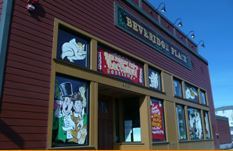 Beveridge Place Pub
Beveridge Place Pub6413 California Ave. S.W.
Seattle, WA 98136
Saturday, June 6, 2015
3:00 p.m. - 6:00 p.m.
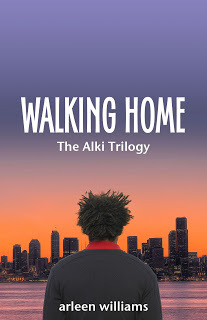 Seattle is a long way from the Horn of Africa. Despite escaping his country’s violence, Kidane is never too far from the nightmares and despair of his past. A new country, a new hope, and a new love may not be enough to save him. Only when he is able to face his worst fears can he have any hope of being truly free.
Seattle is a long way from the Horn of Africa. Despite escaping his country’s violence, Kidane is never too far from the nightmares and despair of his past. A new country, a new hope, and a new love may not be enough to save him. Only when he is able to face his worst fears can he have any hope of being truly free. Copies of all three books in The Alki Trilogy will be available at discount prices at the party. If you are a Kindle reader, Biking Uphill is currently on sale for $1.99 and RunningSecrets is free to KindleUnlimited customers.
In today's publishing world reviews matter. If you enjoy my work, please take a moment to write a review on Amazon.com. Thank you!
Published on June 01, 2015 06:31
May 28, 2015
Finding Home: Other Voices
Today we have a wonderful post from Tamsen Schultz on the importance of home and the decisions we make to find it.

Why Having Beacon Hill in Boston wasn’t home. It wasn’t even where I thought I might want to end up sometime down the road. It was (and is) a stunningly beautiful neighborhood though. With its ornate brownstones, views of the river, and proximity to the heart of Boston, it was a neighborhood I used to like to walk through when I worked for the State of Massachusetts. I’d moved to Brookline, a Boston suburb so close to the city so as to be almost indistinguishable from it, after finishing my undergraduate degree at Mount Holyoke, a women’s college about 1.5 hours west. It seems that our class split in three with most of us either moving to New York, DC, or Boston. I chose Boston because a friend had an extra room in the apartment she was sub-leasing and I was able to get a job working the field I wanted to be in (does that even happen anymore out of undergrad???).
I don’t want to pretend that I was any more intuitive than any other twenty-two year old at the time, but I will say that my four years of living in that area seemed to be one (good) coincidence after another – so much so that even a self-absorbed young adult recognized my good fortune. My college has a strong alumnae association and when I decided I wanted to go into law and conflict resolution, I found an alumna who worked in the field and a few months later I had a job working for the state. My friend found the apartment and with the apartment came a roommate who would, shortly after I moved in, introduce me to my future husband. In the meantime, I took a course on negotiation, met someone who worked for an international non-profit that ended up hiring me, then ended up working for the private foundation of one of that organization’s board members. I got married, got pregnant, and got into law school. It was a whirlwind of four years and a time and a place that holds a special spot in my heart and memories.
But it was never really home.
When I got pregnant my (and my husband’s) thoughts turned to our own families. His family was in India and we weren’t interested in moving to Mumbai. But my family was in California, a state I had always, and still, consider home. Maybe it’s because generations of my family are from there, maybe it’s because it was where I grew up, or maybe it was because that was where family was. Most likely, it was all of the above. In a lucky set of even more coincidences (and yes, some hard work too), my husband got a job offer in Mountain View (in the Silicon Valley) and I received a scholarship to attend Santa Clara Law school, twenty minutes from where he worked and where we ended up living. Both our boys were born in California – seventh generation Californian on my side and first generation American on my husband’s. We made friends, spent time with family, and yes, enjoyed the weather and wine. But somewhere else was calling to us.
At the beginning of my third year of law school, my husband’s company offered him a job near Seattle. I wanted the opportunity for him. We had promised each other during our wedding to try to always listen to what each other wanted – what was voiced andwhat was left silent in our minds and hearts. I knew he wanted the opportunity. I knew I could make it home. And I knew the flight was short between Seattle and Northern California.
And so we moved. We moved to a beautiful suburb and into a lovely home. We had horses for a short while (one of my less well thought out plans) and got involved in jobs (for us) and school and sports (for the boys). My husband’s parents came to live with us and though sometimes it was a little cozier than I would have liked, I wouldn’t have traded it for anything. Over the nine years we were there we made some of the best friends – friends we still see, friends we still travel with, friends our boys still consider to be second parents. After nine years, the Seattle area was as close to home as I could get. Without it actually being home.
After my mother in law passed away very suddenly in 2012, my husband and I did what I think a lot of people do when they’ve lost a loved one. We looked around and asked ourselves, was this what we wanted? Not from a job perspective, but from life. There was so much to love about where we were and even though I knew moving was the right thing, I still cried when we left behind our friends and our neighborhood and yes, even my job. But leave we did. Because we’d decided that what we wanted from life was family – what our “home” was, was family. Not just the four of us, but the big messy lot of us including my grandmother’s cousin twice removed on her father’s side (if you know what I mean).
We moved back to California in the end of 2012 and though it hasn’t always been easy – transition is hard in so many ways – we are surrounded by family. My boys see their grandparents nearly every day and their uncle as often as they can. Aunts, uncles, cousins, nieces, nephews are all within a few hours’ drive and it’s brought a sense of belonging and home I didn’t even feel when we lived in the Silicon Valley which is only a few short hours away.
But more importantly, what it’s also brought is the chance to embrace something I’d always suspected, but never really tested - that for me “home” truly is where family is. But I will also say that feeling these roots, this sense of belonging, has also given me the freedom to know something else I have long suspected - that I have family I have chosen too. I have family that live in Washington, in Idaho, New York, Massachusetts, and many other places. While it’s true, I have found my home here in Northern California, I’m lucky enough to have some of the best vacation “homes” all over the world. Tamsen Schultz is the author of several romantic suspense novels and American Kin (a short story published in Line Zero Magazine). In addition to being a writer, she has a background in the field of international conflict resolution, has co-founded a non-profit, and currently works in corporate America. Like most lawyers, she spends a disproportionate amount of time thinking (and writing) about what it might be like to do something else. She lives in Northern California in a house full of males including her husband, two sons, three cats, a dog, and a gender-neutral, but well-stocked, wine rack.
Tamsen Schultz is the author of several romantic suspense novels and American Kin (a short story published in Line Zero Magazine). In addition to being a writer, she has a background in the field of international conflict resolution, has co-founded a non-profit, and currently works in corporate America. Like most lawyers, she spends a disproportionate amount of time thinking (and writing) about what it might be like to do something else. She lives in Northern California in a house full of males including her husband, two sons, three cats, a dog, and a gender-neutral, but well-stocked, wine rack.

Why Having Beacon Hill in Boston wasn’t home. It wasn’t even where I thought I might want to end up sometime down the road. It was (and is) a stunningly beautiful neighborhood though. With its ornate brownstones, views of the river, and proximity to the heart of Boston, it was a neighborhood I used to like to walk through when I worked for the State of Massachusetts. I’d moved to Brookline, a Boston suburb so close to the city so as to be almost indistinguishable from it, after finishing my undergraduate degree at Mount Holyoke, a women’s college about 1.5 hours west. It seems that our class split in three with most of us either moving to New York, DC, or Boston. I chose Boston because a friend had an extra room in the apartment she was sub-leasing and I was able to get a job working the field I wanted to be in (does that even happen anymore out of undergrad???).
I don’t want to pretend that I was any more intuitive than any other twenty-two year old at the time, but I will say that my four years of living in that area seemed to be one (good) coincidence after another – so much so that even a self-absorbed young adult recognized my good fortune. My college has a strong alumnae association and when I decided I wanted to go into law and conflict resolution, I found an alumna who worked in the field and a few months later I had a job working for the state. My friend found the apartment and with the apartment came a roommate who would, shortly after I moved in, introduce me to my future husband. In the meantime, I took a course on negotiation, met someone who worked for an international non-profit that ended up hiring me, then ended up working for the private foundation of one of that organization’s board members. I got married, got pregnant, and got into law school. It was a whirlwind of four years and a time and a place that holds a special spot in my heart and memories.
But it was never really home.
When I got pregnant my (and my husband’s) thoughts turned to our own families. His family was in India and we weren’t interested in moving to Mumbai. But my family was in California, a state I had always, and still, consider home. Maybe it’s because generations of my family are from there, maybe it’s because it was where I grew up, or maybe it was because that was where family was. Most likely, it was all of the above. In a lucky set of even more coincidences (and yes, some hard work too), my husband got a job offer in Mountain View (in the Silicon Valley) and I received a scholarship to attend Santa Clara Law school, twenty minutes from where he worked and where we ended up living. Both our boys were born in California – seventh generation Californian on my side and first generation American on my husband’s. We made friends, spent time with family, and yes, enjoyed the weather and wine. But somewhere else was calling to us.
At the beginning of my third year of law school, my husband’s company offered him a job near Seattle. I wanted the opportunity for him. We had promised each other during our wedding to try to always listen to what each other wanted – what was voiced andwhat was left silent in our minds and hearts. I knew he wanted the opportunity. I knew I could make it home. And I knew the flight was short between Seattle and Northern California.
And so we moved. We moved to a beautiful suburb and into a lovely home. We had horses for a short while (one of my less well thought out plans) and got involved in jobs (for us) and school and sports (for the boys). My husband’s parents came to live with us and though sometimes it was a little cozier than I would have liked, I wouldn’t have traded it for anything. Over the nine years we were there we made some of the best friends – friends we still see, friends we still travel with, friends our boys still consider to be second parents. After nine years, the Seattle area was as close to home as I could get. Without it actually being home.
After my mother in law passed away very suddenly in 2012, my husband and I did what I think a lot of people do when they’ve lost a loved one. We looked around and asked ourselves, was this what we wanted? Not from a job perspective, but from life. There was so much to love about where we were and even though I knew moving was the right thing, I still cried when we left behind our friends and our neighborhood and yes, even my job. But leave we did. Because we’d decided that what we wanted from life was family – what our “home” was, was family. Not just the four of us, but the big messy lot of us including my grandmother’s cousin twice removed on her father’s side (if you know what I mean).
We moved back to California in the end of 2012 and though it hasn’t always been easy – transition is hard in so many ways – we are surrounded by family. My boys see their grandparents nearly every day and their uncle as often as they can. Aunts, uncles, cousins, nieces, nephews are all within a few hours’ drive and it’s brought a sense of belonging and home I didn’t even feel when we lived in the Silicon Valley which is only a few short hours away.
But more importantly, what it’s also brought is the chance to embrace something I’d always suspected, but never really tested - that for me “home” truly is where family is. But I will also say that feeling these roots, this sense of belonging, has also given me the freedom to know something else I have long suspected - that I have family I have chosen too. I have family that live in Washington, in Idaho, New York, Massachusetts, and many other places. While it’s true, I have found my home here in Northern California, I’m lucky enough to have some of the best vacation “homes” all over the world.
 Tamsen Schultz is the author of several romantic suspense novels and American Kin (a short story published in Line Zero Magazine). In addition to being a writer, she has a background in the field of international conflict resolution, has co-founded a non-profit, and currently works in corporate America. Like most lawyers, she spends a disproportionate amount of time thinking (and writing) about what it might be like to do something else. She lives in Northern California in a house full of males including her husband, two sons, three cats, a dog, and a gender-neutral, but well-stocked, wine rack.
Tamsen Schultz is the author of several romantic suspense novels and American Kin (a short story published in Line Zero Magazine). In addition to being a writer, she has a background in the field of international conflict resolution, has co-founded a non-profit, and currently works in corporate America. Like most lawyers, she spends a disproportionate amount of time thinking (and writing) about what it might be like to do something else. She lives in Northern California in a house full of males including her husband, two sons, three cats, a dog, and a gender-neutral, but well-stocked, wine rack.
Published on May 28, 2015 06:35
May 26, 2015
Finding Home: A Brief Hiatus
When I began the Finding Home blog series, a mini-memoir exploring the meaning of home, I thought it would be completed by the time my third novel, Walking Home, was released. I was wrong. I hope you'll excuse a brief interruption in the series as I share updates related to the book launch each Tuesday for the next little while. Meanwhile, the companion series, Finding Home: Other Voices, will continue uninterrupted every Thursday.
 Who knew Bing Crosby was born in Tacoma, WA and grew up in Spokane, WA? And that was only one of the many surprises this Washingtonian enjoyed last weekend when I dragged my husband, Tom, to Spokane for a bookstore reading and mini-vacation, bikes loaded on the back of the car. We saw Bing Crosby's pipe (or one of many pipes, I'm sure) in the historic Davenport Hotel, and quickly learned that Spokane had more to offer than either of us expected.
Who knew Bing Crosby was born in Tacoma, WA and grew up in Spokane, WA? And that was only one of the many surprises this Washingtonian enjoyed last weekend when I dragged my husband, Tom, to Spokane for a bookstore reading and mini-vacation, bikes loaded on the back of the car. We saw Bing Crosby's pipe (or one of many pipes, I'm sure) in the historic Davenport Hotel, and quickly learned that Spokane had more to offer than either of us expected.We left Seattle in gray drizzle and arrived in Spokane at the far side of Washington State four and a half hours later to bright, big-sky sunshine. I was scheduled to read at Auntie's Bookstore, a classy independent bookstore serving the city and surrounding areas since 1978. This was the first reading of my new novel, Walking Home, released by Booktrope Editions last month, and I was excited to share it.
They say that folks in Spokane "go to the lake" for Memorial Day weekend, and with temperatures in the high eighties there was no crowd at Auntie's. Still, I had the pleasure of meeting and hearing author, David Armstrong, visiting with events organizer, Jess Lucht and conversing with our small but interested audience.
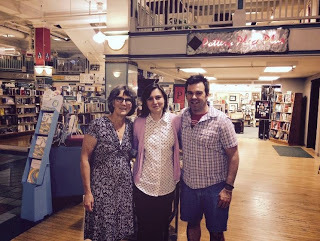 Sunday was for biking. For my Seattle cycling buddies - the Spokane Centennial Trail is not the Snohomish Centennial Trail. Having ridden the length of the Westside trail, I was imagining a leisurely, flat, riverside ride. That it was not. We headed west out of town from Riverside Park and the hills got the best of me. I found myself wheezing from the March flu I apparently haven't completely beaten. Still, it was a beautiful ride through pine forests with nonstop views of the Spokane river. We'll have to return to do the east end.
Sunday was for biking. For my Seattle cycling buddies - the Spokane Centennial Trail is not the Snohomish Centennial Trail. Having ridden the length of the Westside trail, I was imagining a leisurely, flat, riverside ride. That it was not. We headed west out of town from Riverside Park and the hills got the best of me. I found myself wheezing from the March flu I apparently haven't completely beaten. Still, it was a beautiful ride through pine forests with nonstop views of the Spokane river. We'll have to return to do the east end.
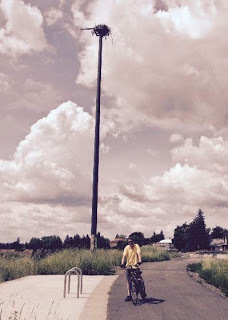 Tom and an osprey nest
Tom and an osprey nest
 What surprised and pleased us the most about our visit was the number of wonderful restaurants we found. At the risk of sounding like Seattle snobs, we simply didn't expect such a lively restaurant scene. To name just a few of the places we visited during our short visit: Mizuna, Scratch, Madeleine's, Wild Sage, Sante. We peeked into Durkin's but just couldn't squeeze in another meal. I'm sure there are others we missed as well. The glutenfree almond flour ravioli and "Port Flight" dessert at Wild Sage are reasons enough to return to Spokane!
What surprised and pleased us the most about our visit was the number of wonderful restaurants we found. At the risk of sounding like Seattle snobs, we simply didn't expect such a lively restaurant scene. To name just a few of the places we visited during our short visit: Mizuna, Scratch, Madeleine's, Wild Sage, Sante. We peeked into Durkin's but just couldn't squeeze in another meal. I'm sure there are others we missed as well. The glutenfree almond flour ravioli and "Port Flight" dessert at Wild Sage are reasons enough to return to Spokane! 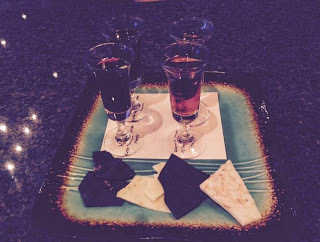 So thank you to Jess Lucht at Auntie's Bookstore and all the wonderful people of Spokane for a terrific Memorial Day weekend. It even was worth the extra 45 minutes of miserable traffic on the way back to Seattle!
So thank you to Jess Lucht at Auntie's Bookstore and all the wonderful people of Spokane for a terrific Memorial Day weekend. It even was worth the extra 45 minutes of miserable traffic on the way back to Seattle!
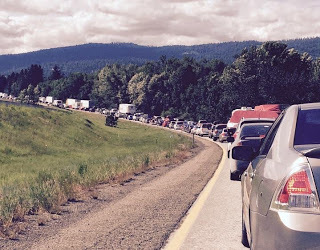
Published on May 26, 2015 13:34
May 21, 2015
Finding Home: Other Voices
Today I'm pleased to share another story of finding home in Mexico City, from author Claudia Long.
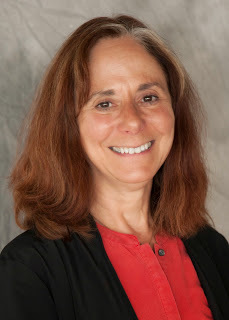
Mexico Lindo, Where My Heart is Home
I moved 14 times in my first 17 years for reasons too tiresome to detail, but I always knew where home was. I grew up in Mexico City, and for me, calle Puebla, Puebla Street, was always where my heart was.
Our fortunes ebbed and flowed while I was growing up, and for a time we lived in a strange and dingy three-room place in a tall building. It was in that building, on Calle Rio Rin, that my father brought home a tiny puppy in his pocket, to my mother's tolerant dismay. We named that mutt Corky, or Cokis in Spanish since the foreign word was clumsy on the tongue.
We moved to a large stone home at some point, and the walls crawled with tarantulas and scorpions. My father used to come into our bedroom at night with a baseball bat to kill tarantulas. After my sister was stung on the knee by a scorpion when we returned from a long trip and she knelt to pet Cokis, we moved. From there I remember a rambling house with a huge flowering garden, where milk was delivered by a dun-colored burro. My mother had to boil the milk to pasteurize it, and I found the smell nauseating. This was 1962, so we just substituted the delicious café de olla, coffee spiced with cinnamon, for the disgusting milk, engendering my lifelong love of coffee.
I was nine when we moved to Calle Puebla. The apartment on Puebla took up half of the top two floors of a five-storey building. The building had an entrance door for humans, and a gate for cars and the gas- and wood-trucks that delivered heating fuels early in the morning. From the terrace on the top floor you could see Popocateptl on the increasingly rare clear days, and the faint outline of Ixtazihuatl in the distance. Popo was the male volcano, rising phallically into the clouds, and Ixta was his mate, undulating mountains of sleeping woman. We lived there for two and a half years, and whenever I think of home, that's where my mind goes.
We had little planters all around the terrace and my mother grew geraniums in them, brilliant red flowers with furry green leaves. The sky was blue with "towering cumuli" as the English-station weatherman used to say on the radio almost every day. In the spring, as the dry season wore on into choking dust, the horizon would be obscured with a brown haze that Los Angeles later re-named smog, but for now it was dust and exhaust and the fact that the rains had not yet come, and our eyes watered as we walked down the street choked with cars and buses spewing black smoke.
One day we got the word that the great God of Rain, Tlaloc, had been found by archeologists. It was unearthed and was going to be brought to the City on the back of a truck. Lines of people formed alongside the roads to see the great stone god, and my father realized that we would have a better view of the event from the terrace than if we tried to worm our way into the crowds. As Tlaloc made his dramatic entrance, the skies, bright blue through the smog until that day, darkened suddenly, and opened their reserves of water. Rain came down in torrents, drenching the eager crowd, washing the streets and skies, and running in rivers through the gutters. Thunder and lightning accompanied the god, letting us all know that we had trifled with the wrong guy.
When I was eleven we moved to New York, and I have only been back to visit a few times. The last time I saw Calle Puebla, about ten years ago, the street had hardly changed. There was still the dry-cleaner and the paper goods store, and the little convenience store where I spent my allowance on candy. The vacant lot across the street where my little brother played cars in the dirt was now a high-rise though, and my old building's paint was peeling and dull.
Of course, it has been nearly 50 years since we moved away, so it's amazing more hasn't changed. But maybe I have the right to expect permanence when home is a land where a rain god can still wreak havoc for having his sleep of 300 years disturbed.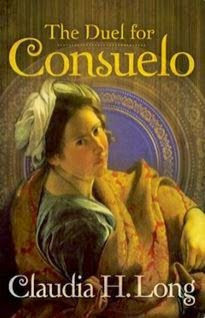 Claudia H. Long is the author of
Josefina's Sin
and
The Duel for Consuelo
, two historical novels of Colonial Mexico. She grew up in Mexico City, and lives in Northern California with her husband and too many dogs. And a cat. Like Claudia on Facebook at www.facebook.com/ClaudiaHLongand enjoy her blog at www.claudiahlong.com/blog.
Claudia H. Long is the author of
Josefina's Sin
and
The Duel for Consuelo
, two historical novels of Colonial Mexico. She grew up in Mexico City, and lives in Northern California with her husband and too many dogs. And a cat. Like Claudia on Facebook at www.facebook.com/ClaudiaHLongand enjoy her blog at www.claudiahlong.com/blog.

Mexico Lindo, Where My Heart is Home
I moved 14 times in my first 17 years for reasons too tiresome to detail, but I always knew where home was. I grew up in Mexico City, and for me, calle Puebla, Puebla Street, was always where my heart was.
Our fortunes ebbed and flowed while I was growing up, and for a time we lived in a strange and dingy three-room place in a tall building. It was in that building, on Calle Rio Rin, that my father brought home a tiny puppy in his pocket, to my mother's tolerant dismay. We named that mutt Corky, or Cokis in Spanish since the foreign word was clumsy on the tongue.
We moved to a large stone home at some point, and the walls crawled with tarantulas and scorpions. My father used to come into our bedroom at night with a baseball bat to kill tarantulas. After my sister was stung on the knee by a scorpion when we returned from a long trip and she knelt to pet Cokis, we moved. From there I remember a rambling house with a huge flowering garden, where milk was delivered by a dun-colored burro. My mother had to boil the milk to pasteurize it, and I found the smell nauseating. This was 1962, so we just substituted the delicious café de olla, coffee spiced with cinnamon, for the disgusting milk, engendering my lifelong love of coffee.
I was nine when we moved to Calle Puebla. The apartment on Puebla took up half of the top two floors of a five-storey building. The building had an entrance door for humans, and a gate for cars and the gas- and wood-trucks that delivered heating fuels early in the morning. From the terrace on the top floor you could see Popocateptl on the increasingly rare clear days, and the faint outline of Ixtazihuatl in the distance. Popo was the male volcano, rising phallically into the clouds, and Ixta was his mate, undulating mountains of sleeping woman. We lived there for two and a half years, and whenever I think of home, that's where my mind goes.
We had little planters all around the terrace and my mother grew geraniums in them, brilliant red flowers with furry green leaves. The sky was blue with "towering cumuli" as the English-station weatherman used to say on the radio almost every day. In the spring, as the dry season wore on into choking dust, the horizon would be obscured with a brown haze that Los Angeles later re-named smog, but for now it was dust and exhaust and the fact that the rains had not yet come, and our eyes watered as we walked down the street choked with cars and buses spewing black smoke.
One day we got the word that the great God of Rain, Tlaloc, had been found by archeologists. It was unearthed and was going to be brought to the City on the back of a truck. Lines of people formed alongside the roads to see the great stone god, and my father realized that we would have a better view of the event from the terrace than if we tried to worm our way into the crowds. As Tlaloc made his dramatic entrance, the skies, bright blue through the smog until that day, darkened suddenly, and opened their reserves of water. Rain came down in torrents, drenching the eager crowd, washing the streets and skies, and running in rivers through the gutters. Thunder and lightning accompanied the god, letting us all know that we had trifled with the wrong guy.
When I was eleven we moved to New York, and I have only been back to visit a few times. The last time I saw Calle Puebla, about ten years ago, the street had hardly changed. There was still the dry-cleaner and the paper goods store, and the little convenience store where I spent my allowance on candy. The vacant lot across the street where my little brother played cars in the dirt was now a high-rise though, and my old building's paint was peeling and dull.
Of course, it has been nearly 50 years since we moved away, so it's amazing more hasn't changed. But maybe I have the right to expect permanence when home is a land where a rain god can still wreak havoc for having his sleep of 300 years disturbed.
 Claudia H. Long is the author of
Josefina's Sin
and
The Duel for Consuelo
, two historical novels of Colonial Mexico. She grew up in Mexico City, and lives in Northern California with her husband and too many dogs. And a cat. Like Claudia on Facebook at www.facebook.com/ClaudiaHLongand enjoy her blog at www.claudiahlong.com/blog.
Claudia H. Long is the author of
Josefina's Sin
and
The Duel for Consuelo
, two historical novels of Colonial Mexico. She grew up in Mexico City, and lives in Northern California with her husband and too many dogs. And a cat. Like Claudia on Facebook at www.facebook.com/ClaudiaHLongand enjoy her blog at www.claudiahlong.com/blog.
Published on May 21, 2015 06:47
May 19, 2015
Finding Home: Six Years in Mexico City
I didn’t fly directly from Oahu to Mexico City, but spent two weeks couch surfing in LA before boarding another flight. Was it fear of the unknown, of starting over once again? I’m not certain and my old journals shed little light. What I did know was that I was flying into the most populous city on the face of the earth in 1979. The Federal District (el D.F.) had not yet hit its current population of 20-21 million inhabitants, but it was an enormous, polluted city at the top of a flat, dry plateau.
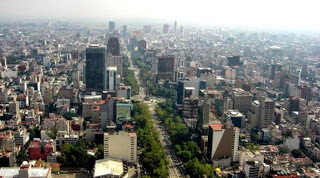 It took my body months to adjust to the elevation. The dizziness was at times frightening and the weakness debilitating, but despite the shock to my system – I mean what could have been more different from the North Shore? – I adjusted and stayed.
It took my body months to adjust to the elevation. The dizziness was at times frightening and the weakness debilitating, but despite the shock to my system – I mean what could have been more different from the North Shore? – I adjusted and stayed. The city was overwhelming. Only taking it one colonia at a time made it manageable. Each colonia or area felt like an individual city with its own character. I lived in only two apartments in two neighboring colonias during my time there. The first was rent-free, much like the Caracas place, but only for a few months between lease-holders. The student who found it for me also helped me locate the apartment that remained mi casa for the duration of my stay.
Mi casa was actually the lower back apartment in a two-story concrete block of six apartments behind the main, street-front house. There was only one entrance. I had to unlock a metal door to the owners’ carport and pass their house, then follow a walkway to my own front door at the back of the property. The walkway was about three feet wide with the apartment building to the right and a concrete wall to the left. The cave-like apartment consisted of two small rooms – living room and bedroom – with a tiny kitchen off the living room and an equally tiny bathroom off the bedroom.
There was another walkway to the second floor apartments overhead. Tunnel-like but not closed in, there was enough daylight on the lower level outside my front door to grow small plants in terracotta pots. I pounded nails into the cracks in the mortar of the concrete block wall and wrapped wire around the pots to hang them. I was desperate for anything living and green in the city of concrete I claimed as my home.
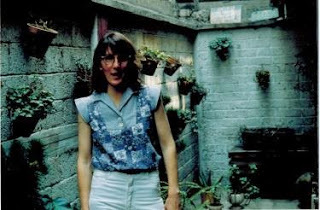 I found work immediately and never lacked teaching positions. I taught in private language institutes, corporate offices, restaurant kitchens, and secondary schools criss-crossing the city by bus, pesero, and subway. I lived alone for three years, though there was often someone--between jobs or boyfriends, another ex-pat deciding to stay or go--sleeping on my sofa. I watched and struggled with the same decisions: Was this really home? Could I make this home? Did I belong?
I found work immediately and never lacked teaching positions. I taught in private language institutes, corporate offices, restaurant kitchens, and secondary schools criss-crossing the city by bus, pesero, and subway. I lived alone for three years, though there was often someone--between jobs or boyfriends, another ex-pat deciding to stay or go--sleeping on my sofa. I watched and struggled with the same decisions: Was this really home? Could I make this home? Did I belong? I married a good man, a man who loved me, a man whose family accepted me. I'm not sure where I'd be today if I'd stayed, if tragedy hadn't brought me back to Seattle. But tragedy has a way of pulling family together, and when it struck, three years into the marriage, my roots proved stronger than the home I'd built for myself as an ex-pat. After six years convincing myself I must have been Latina in a previous life, I quit my teaching position, packed up our household and returned stateside with husband in tow.
But what is home? Was it my first family or this new husband from a place and a culture so remote from my own? Was it my large first family or my husband's family? Was it an either/or? Couldn't home be both? I had no idea. All I knew at the time was that an invisible cord allowing no dissent pulled me back to Seattle. I left behind a life I'd built for myself without ever looking back. I returned only once after the earthquakes of 1985 to visit the in-laws who very soon were no longer family at all.
I wonder, even now, so many decades later, a lifetime later, what I was searching for, what caused me to abandon all I knew for the life of an ex-pat. It wasn't love--I'd moved to Mexico City several years before ever meeting the man who would become my husband of three years. It was an adventure, yes, but something more. I tell people I was fed up with U.S. politics and American materialism, and maybe that was true, but it was still only half the story. Something was missing. Home was missing. What I
Don't want to miss a single post? Get them delivered by entering your email in the box in the lower right To read the prior posts in this mini-memoir series, go to the posts listing in the left side bar. If no longer visible, just click on "March" and "April" to select.
Published on May 19, 2015 07:10
May 14, 2015
Finding Home: Other Voices
Today I'm pleased to share this post from Ina Zajac: How My Neighbors Became “Neigh-Friends.”
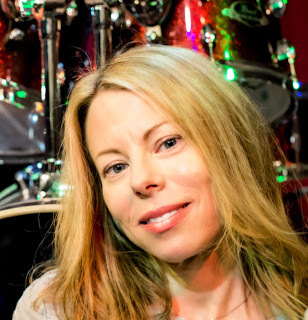 Recently, I’ve decided to start calling my “neighbors” what they really are—“neigh-friends.”
Recently, I’ve decided to start calling my “neighbors” what they really are—“neigh-friends.” Ina’s definition: Neigh-friend (noun) 1. A person living in close proximity to another unrelated person who shares communal interests; especially related to the physical, social and educational welfare of children, as well as pets, and the local environment. Neigh-friends form and maintain long-term, mutually supportive and protective relationships.
The home I share with my neigh-friendsIt was the afternoon of April 30th when I picked up my eight-year-old daughter from school. Just a typical Thursday; I was driving her to a sewing class. Side note: I’m not sure why she’s interested in sewing. I can barely secure a button. We’ll just say it’s a skill she’ll have to learn elsewhere.
While driving down the same old road I’d traveled a thousand times, silver blurred in from my left. I had this rational “oh, this is how it ends” sort of feeling as I recognized it was a SUV slamming into us. Our Honda CRV spun out, took out two signs and ended up in a ditch, facing the wrong direction. It didn’t happen in slow motion. Nothing meaningful flashed before my eyes—no lifetime-achievement-highlight reel. The side impact air bags came down, but I bumped my head pretty hard; maybe because I'm 5'1". No blood, just ringing in my ears, and splotches slithering through my field of vision.
My daughter, on the non-impact side of the car, was shaken up, but seemed ok. “We’re okay, we’re okay,” I blithered to her like an idiot. It’s that mommy thing we all do. “See, mommy’s okay? See, no blood?” I tried to hide my shaky hands.
Within 10 seconds there were several people assisting us. One sweetheart of a man, told us not to move, not to try to crawl out of the car. Another was on his cell, calling 9-1-1. Others were helping the other driver whose car had somehow ended up in a ditch around the corner. Police and paramedics arrived within two minutes. By then a school bus had arrived, and 15 or so elementary school kids were walking by the scene. It was surreal hearing several of them asking my daughter, “Are you okay?” She just nodded and looked down at the ground. I felt for her; she didn’t want them to see her crying.
“Ina! Ina!” I heard from across the street. “Are you okay?” It was a lovely PTA mom, I barely know. We often smile at each other in the school hallway; her smile can melt butter.
So much like my daughter, I downplayed the situation. “Oh, it’s okay. We’re good. Thanks.”
It’s the same way I answered questions from the paramedics. “Do you want to go to the ER?” No. “Are you sure?” Yes. “Do you know what day it is?” Um. Thursday. “Do you need a ride home?” No. A few minutes later, a police officer insisted he drive us home. “What are you going to do, call Uber?” he asked with a steady smile. “We’ll get you home.” He assured me that they did it all of the time.
Within an hour the texts and calls started coming in from friends and neighbors. Can we drive you anywhere? Why aren’t you at the ER? Can we bring you dinner? Do you need a babysitter so you can get some rest? The side of my head throbbed as I told them, “I’m okay, thanks.”
I was pretty out of it the next few of days. I had been expecting to be stiff and sore, but there were other symptoms I hadn’t expected. All of a sudden I couldn’t remember my Amazon password. No biggie. But then I realized I couldn't remember my g-mail password either or facebook. I tried to finish a story for my fiction writing class and could not write. I could NOT string two sentences together. My author friends will understand how terrifying this felt. I had been scheduled to take part in a writing event at my neighborhood bookstore (Third Place Books). When I called to cancel, I didn’t tell them why. I couldn’t say, “My brain is mush, and I’m afraid I’ll never write again.” And so, I just cancelled without explanation.
My doctor prescribed muscle relaxers and oxycodone, and told me to let my brain rest. Supportive calls and texts continued to come in. My daughter, cleared by her doctor, did a couple of play dates while I rested. It took me a while to realize just how lucky we had been. At the time of the accident, school had just gotten out. The reason my neigh-friends were there to help so fast is because several of them had been standing on the corner waiting for their children’s school bus to arrive. They had been on the safe side of the street—the side my 3,500-pound car did not sweep through. God, what if? What if the school bus had come one minute earlier and the sidewalk had been full of children? These are the questions that have been dogging me at night.
While I haven’t been doing much writing lately, I have been doing a lot of thinking—and thanking. Mother’s Day was particularly special this year. It’s been almost two weeks since the accident. While I’m still hurting, I am getting stronger every day. I’m excited to start physical therapy. I’m also getting better accepting help. After some candid conversations with my neigh-friends, I have learned that they want to help, and that’s it’s not really even about me. It’s what they want to do because we are doing life together, and that’s what community means.
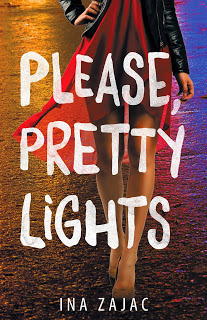 An experienced feature writer, Ina Zajac is an avid people watcher, and lover of quirk and contrast. She enjoys creating contemporary characters; and is especially fond of gritty musicians, passionate artists and irreverent free thinkers.
An experienced feature writer, Ina Zajac is an avid people watcher, and lover of quirk and contrast. She enjoys creating contemporary characters; and is especially fond of gritty musicians, passionate artists and irreverent free thinkers. Zajac's fiction writing is influenced by her fascination with music, art and her hometown Seattle. She does not shy away from provocative topics such as religion, addiction and violence. She also explores playful, uplifting topics related to the mystical and metaphysical. She is a fan of Alan Watts, Duncan Trussell and Abraham Hicks. "Remember who you are"—the central theme of Please, Pretty Lights —comes from this universal perspective.
She holds a bachelor's degree in journalism from Western Washington University; a master's degree in mass communication (emphasis in women's studies) from Arizona State University; and currently studies fiction writing at the University of Washington.
Published on May 14, 2015 06:54
May 12, 2015
Finding Home: Three Months on the North Shore
When my older brother showed up in Santa Cruz, climbed to the top of the tall fir that caressed the side of my tiny cottage, and offered me a plane ticket to Hawaii, how could I refuse? We both knew there was nothing holding me to Santa Cruz. My brother and his girlfriend needed a nanny/house sitter and I'd never been to Hawaii. It was a win-win though frankly I can't imagine anyone leaving their kids and home in my care. I could hardly care for myself.
The house stood on a lush hillside overlooking Waimea Bay on the North Shore of Oahu. The view from the wide lanai took my breath away, literally. I felt as though I were on the top of the world. And that was before I was handed the keys to the bird shell blue convertible Karmann Ghia and the bridle to a beautiful bay gelding. I'm not sure which I fell in love with first.
Despite my wanderings, I was still a country girl. The beach scene wasn't for me. The sun gave me skin rash, the salt made me itch, and I was easily bored. I didn't have the balance for surfing, was too claustrophobic to try scuba, and knew nothing of the joys of snorkeling. Besides, this was long before prescription mask lenses had been developed for my dreadful eyesight.
The kids were school age. I dropped them off and picked them up daily. The rest of the day was mine. Alone. I rode the mountains and beaches most days, and filled the rest of my hours mastering backgammon at a local hangout with men twice my age. One day my favorite backgammon buddy handed me a clipping from the local newspaper.
"See this, girlie?" he asked.
"What?" I asked without looking up from the board.
"This you, no? You and that big horse you on?"
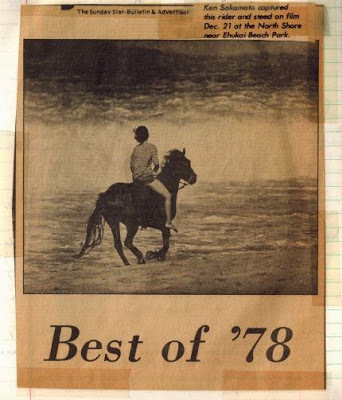 Unbelievable. All along I thought I was invisible, floating on the periphery of island culture and the international surf scene. Best of '78? I didn't feel like the best of anything. Yet it was true, on Mahele's back with the sea breeze in my face, the roar of surf in my ears, the warm water splashing my bare legs, I felt strong and free. Capable of anything.
Unbelievable. All along I thought I was invisible, floating on the periphery of island culture and the international surf scene. Best of '78? I didn't feel like the best of anything. Yet it was true, on Mahele's back with the sea breeze in my face, the roar of surf in my ears, the warm water splashing my bare legs, I felt strong and free. Capable of anything. I remember the heavy pungent fragrance of the pineapple fields, the rush of humid warm wind, as I sped across the island, top down, Jimmy Buffet crooning. I remember the temptations of the North Shore. I remember the lines of cocaine and the rows of tent camps that seemed to mushroom when the surf was up. Once again I was a stranger in a land and culture as foreign to me as Caracas and Santa Cruz had been. The lifestyle was addictive, my brain felt like mush, and the drug scene was an easy escape.
I decided I needed a job and landed one at the Army PX demonstrating Parker pens. Within a week I decided the surf scene was more real than the army base and returned to my horseback rides and backgammon games. I learned to pronounce the local names and began to pick up some Pidgin. I tried to fit in, but felt I belonged nowhere.
When my brother returned, I had a decision to make: go or stay. My gut told me there was no home for me in Hawaii. As in Santa Cruz, I was neither a local nor a tourist. I didn't belong. A college friend studying in Mexico City had written encouraging me to join her, so when my brother asked what I wanted to do, I accepted the plane ticket he offered and left the islands with my backpack and a couple hundred dollars in my pocket.
Don't want to miss a single post? Get them delivered by entering your email in the box in the lower right To read the prior posts in this mini-memoir series, go to the posts listing in the left side bar. If no longer visible, just click on "March" and "April" to select.
Published on May 12, 2015 06:20
May 10, 2015
A Sometimes Interpreter
I am grateful to JT Twissel for sharing this post on her blog.
 Book 3 of The Alki Trilogy just released!
Book 3 of The Alki Trilogy just released!
Years ago I was living in Mexico City and thought about studying English/Spanish interpretation. When I took the college entrance examination and failed, I was sad and filled with relief. It really wasn't for me. I have too many of my own words and thoughts to express to fill the role of an official interpreter. Yet at times, I still feel like an interpreter. In The Alki Trilogy, I "translate" immigrant lives into stories, offering a window into the realities of modern immigration. Read more ...
 Book 3 of The Alki Trilogy just released!
Book 3 of The Alki Trilogy just released!Years ago I was living in Mexico City and thought about studying English/Spanish interpretation. When I took the college entrance examination and failed, I was sad and filled with relief. It really wasn't for me. I have too many of my own words and thoughts to express to fill the role of an official interpreter. Yet at times, I still feel like an interpreter. In The Alki Trilogy, I "translate" immigrant lives into stories, offering a window into the realities of modern immigration. Read more ...
Published on May 10, 2015 09:45
May 8, 2015
Walking Home Comes Home
Many thanks to E.C. Moore for including my guest post "Walking Home Comes Home" on her beautiful blog From One Bird to Another yesterday.
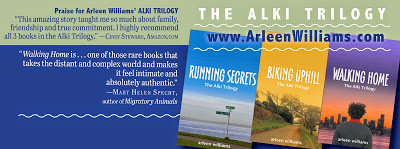 New FB banner: The Alki Trilogy is complete!
New FB banner: The Alki Trilogy is complete!
I walk through the deep forest of Schmitz Park, my daughter's unruly dog chasing scents and shadows in the underbrush, my notebook and pen in my backpack. I need this time alone with the dog in the woods, woods that remind me of the wilderness of my childhood. I imagine a day long ago, before my parents moved their growing family from this West Seattle neighborhood to the Issaquah Valley at the foot of the Cascade Range. I see myself a child of four or five walking these same paths with my older siblings. I marvel at life's journey and struggle to make sense of the chaos of the last five months. My mind tracks backwards outlining as though I were writing an absurdly early holiday letter. Read more ...
 New FB banner: The Alki Trilogy is complete!
New FB banner: The Alki Trilogy is complete!I walk through the deep forest of Schmitz Park, my daughter's unruly dog chasing scents and shadows in the underbrush, my notebook and pen in my backpack. I need this time alone with the dog in the woods, woods that remind me of the wilderness of my childhood. I imagine a day long ago, before my parents moved their growing family from this West Seattle neighborhood to the Issaquah Valley at the foot of the Cascade Range. I see myself a child of four or five walking these same paths with my older siblings. I marvel at life's journey and struggle to make sense of the chaos of the last five months. My mind tracks backwards outlining as though I were writing an absurdly early holiday letter. Read more ...
Published on May 08, 2015 08:12

